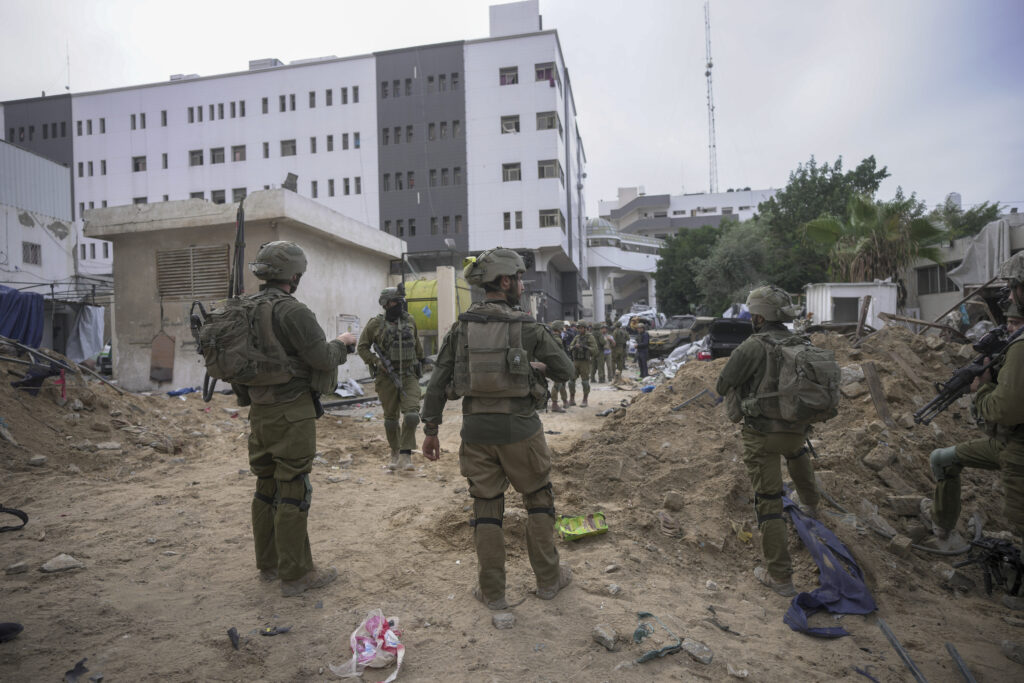
The Shifa Hospital in Gaza has been emblematic of how embedded Hamas is in the everyday life of the enclave, and its return to headlines months after Israel seized it demonstrates the country’s continued fight against the terrorist group.
Last November, the Israel Defense Forces took control of the hospital in the northern part of the strip after it became clear Hamas was using it to shield itself from reciprocal attacks, a common tactic of the extremists. Israeli forces discovered underground infrastructure beneath the hospital previously used by Hamas.
From then on, Israel had systematically moved its way south. But in recent days, Israeli forces have once again found themselves engaged in combat around the medical center, raising serious questions about their stated goal to wipe Hamas and other terrorist entities out.

Israeli military officials said they have killed more than 90 militants since the operations began on Monday, and have captured hundreds more including Mahmoud Qawasmeh, a senior Hamas operative involved in the planning of the 2014 kidnapping and murder of three Israeli soldiers.
“They’ve still been engaging in skirmishes throughout the north since the operation began, so this isn’t a surprise in that sense,” Alex Plitsas, an expert with the Atlantic Council, told the Washington Examiner. “This is the risk that you run, running an operation in an urban environment against an adversary that doesn’t wear uniforms. So they were able to blend back in and make their way back to the hospital. I think it does underscore the potential for continued conflict going on. They obviously haven’t gotten everyone that’s up north.”
As Israeli forces moved south for those operations, they left the hospital and other areas in the north, which allowed Hamas militants who slipped through the Israelis’ grip during their previous operations to attempt a reconstitution.
“What Hamas has done is because Israel pulled back from these areas, they left no military presence there that could prevent Hamas from returning,” Brian Carter, an analyst for the Critical Threats Project at the American Enterprise Institute, told the Washington Examiner. “So Hamas fighters have either returned, infiltrated these areas, or they have reactivated the cells that went to ground as the Israelis cleared.”
The battle at Shifa Hospital represents Hamas’s “efforts to reestablish itself in the northern Gaza Strip,” according to the Washington, D.C.-based Institute for the Study of War’s Tuesday update on the war.
The ability of hundreds of militants to remain in the north months after Israel completed its operations there represents one of the enormous challenges that comes along with urban warfare and the tactics often employed by terror groups. Israel’s willingness to go back to the north for these operations also indicates its willingness to keep fighting to achieve its war efforts to ensure Hamas cannot carry out a subsequent attack like the one perpetrated on Oct. 7, 2023.
“The unfortunate reality for Israel is that the size of Israel’s ground force is insufficient to clear and simultaneously hold all of Gaza,” Bradley Bowman, a director at the Foundation for Defense of Democracies, told the Washington Examiner. “So what happened was the IDF went into the areas around Shifa included. They spent a couple weeks there clearing the hospital, in the hospital they found some weapons, they found a significant amount of underground infrastructure. They demolished that infrastructure, but because of an insufficient number of ground forces, the Israelis moved on.”
This is not, however, the first time Israeli forces have carried out operations in areas they had previously cleared.
Carter noted that Gaza-based militants carried out more than 90 attacks targeting Israeli forces over a nine-day span in late February in Zaytoun, in the southeastern part of Gaza City.
The number of attacks demonstrates “how intense this resurgence has been in some areas,” Carter added, calling this the “starkest number I can really pull out when talking about this reconstitution.”
U.S. officials have estimated that there are still roughly 300,000 people in the northern part of the strip, who are facing the most dire humanitarian conditions in Gaza. International experts have warned they are on the verge of famine due to both a lack of humanitarian aid that’s reaching them and the lack of the infrastructure needed to deliver the aid to these civilians who stayed in northern Gaza.
With Israel’s military leaving a power void in the northern part of the Strip, that area has descended into “anarchy,” U.S. national security adviser Jake Sullivan told reporters earlier this week.
CLICK HERE TO READ MORE FROM THE WASHINGTON EXAMINER
The renewed battle at the hospital, which Israeli military officials have said could continue for a couple more days, comes as Israel prepares to enter Rafah, the southernmost city in Gaza. The U.S. and many Western countries have said they would not support full-scale Israeli operations in the city because more than a million Palestinians have fled there and they anticipate a high civilian casualty count without proper precautions.
Israel has not shown the U.S. its plans for operations, which Israeli Prime Minister Benjamin Netanyahu has repeatedly said is necessary to ensure Hamas’s defeat, but the prime minister has agreed to send a delegation to Washington, D.C., in the coming days to discuss potential alternatives.







